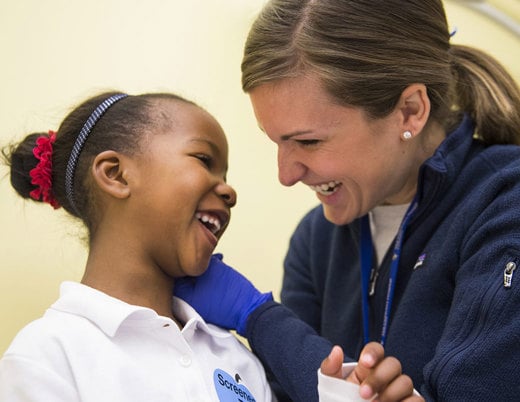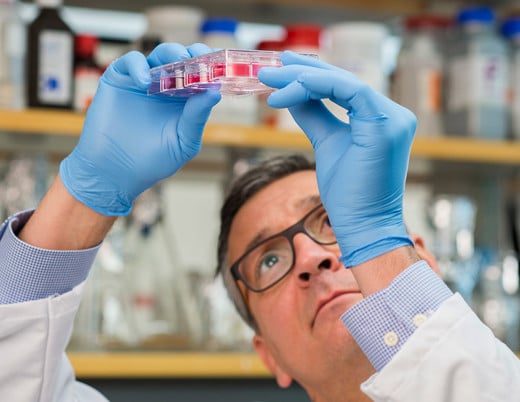Key takeaways
-
Lymph node status plays a major role in tumor staging and subsequent treatments for children with kidney tumors, such as Wilms tumor.
-
The Children’s Oncology Group study protocol mandating this practice is often violated despite its value.
-
A Children’s Colorado study found that sampling more lymph nodes was not linked to surgical complications.
-
Findings may ease perceived barriers limiting surgical approach to lymph node sampling.
Background: role of lymph node sampling in pediatric renal tumor management
Renal (kidney) tumors, with the majority being Wilms tumor, are the most common solid tumors occurring in children.
Lymph node sampling plays an important role in helping determine Wilms tumor stage and the most appropriate treatments. While the Children’s Oncology Group and the Société Internationale d’Oncologie Pédiatrique mandate lymph node sampling during surgery to remove the kidney tumor, it doesn’t always occur.
These groups have not clearly defined how many lymph nodes should be sampled, and there has been concern in the medical community that encouraging extended lymph node sampling would result in increased postoperative complications.
Led by researchers from the Department of Pediatric Urology and the Surgical Oncology Program at Children’s Hospital Colorado, study authors hypothesized that increased lymph node sampling would not increase complications in children who underwent surgery for suspected renal malignancies.
Lead study author Nicholas Cost, MD, is a pediatric urologist and urologic tumor expert. He is co-director of the Surgical Oncology Program at Children’s Colorado and the surgical discipline lead of the Children’s Oncology Group’s Renal Tumor Committee.
Additional study authors from Children’s Colorado included:
Jonathan Roach, MD
Associate Professor, Surgery – Pediatric Surgery
University of Colorado School of Medicine
Surgeon, Center for Children’s Surgery
Children’s Hospital Colorado
Methods: data review of renal tumor surgeries with lymph node sampling
Patient population for this study:
- Retrospective data collected for patients up to age 18
- Underwent open radical or partial nephrectomy with lymph node sampling for suspected malignancy
- Performed by 6 different attending surgeons at Children’s Colorado
- Sampling methods varied
- Between January 2005 and December 2019
Patient exclusions for this study:
- <150 days of postoperative follow-up
- Unknown number of sampled lymph nodes
- Lymph nodes not sent as a separate specimen
Study authors defined the following complications within 150 days of surgery as clinically significant:
- Clavien-Dindo complication ≥ III
- Small bowel obstruction
- Prolonged postoperative ileus
- Chylous ascites
- Symptomatic lymphocele
- Intraoperative solid organ or vascular injury
- Wound infection/abscess
All intraoperative and postoperative complications were recorded and categorized using a Clavien-Dindo scale. Researchers also examined the number of lymph nodes sampled and its effect on the odds of experiencing a clinically significant complication.

Results: Increased lymph node yield did not increase surgical complications
Multivariable Analysis
In a multivariable analysis, the odds of a clinically significant complication did not increase based on the number of lymph nodes sampled.
There was also no difference in:
- Highest Clavien-Dindo grade complication within 30 days of surgery
- Incidence of clinically significant complication
- Operative time
- Volume of intraoperative fluid resuscitation
- Length of stay
Discussion and conclusion: Extended lymph node sampling during renal tumor surgery did not increase surgical complications
Pediatric tumor survival rates are improving through advances made by the collaborative work of pediatric oncology groups. Patient and tumor-specific risk factors, staging and classification help determine the appropriate level of treatment intensity.

A summary of findings from other studies about lymph node sampling in Wilms tumor is included below (see published manuscript for sources, additional details):
For disease management
- Lymph node status is a key factor in determining Wilms tumor survival
- Most common qualifier for Stage III disease
- Highly predictive of event free, overall survival
- Lymph node sampling omission associated with increased of local recurrence
- Increased lymph node sampling can improve staging accuracy
- Higher lymph node yield improves the likelihood of identifying positive lymph nodes
- Up to 10 lymph nodes may be needed for ≤10% false negative rate
Risk of complications
- National Wilms tumor study reported ~20% rate of surgical complications after lymph node sampling
- Small bowel obstruction most common clinically significant complication
- Results similar this study, which had a 14.6% rate of surgical complications
- Advanced local stage, need for adjacent organ resection, tumor thrombus associated with complications during removal of both kidneys
- Small bowel obstruction most common clinically significant complication
- Right-sided tumors associated with increased risk for intraoperative tumor spillage
- Suggests laterality an important determinant for increased surgical complexity
- Almost 4% incidence of chylous ascites, 21-day median delay in diagnosis, due to extensive lymph node sampling above renal hilum
- Another study found 5% rate of chylous ascites, more common after surgery for left-sided tumors
Results from this study that are different from previous literature
- Tumor laterality (right), estimated blood loss, intraoperative fluid resuscitation volume statistically significant predictors of having clinically significant complications
- No difference in other valuable perioperative metrics between the patient cohorts
- No patients diagnosed with chylous ascites
- Fewer complications in patients with left-sided tumors
Findings from several studies about other urologic malignances suggest extended lymph node sampling during kidney surgery may not alter the perioperative course or overall risk of complications.
Key study observations
The authors of this study made several observations:
- Lack of clear guidelines around extent of lymph node sampling may contribute to high rates of omitting lymph node sampling and lower lymph node yield in Wilms tumor and other pediatric renal malignancies.
- Formal anatomic templates for sampling based on tumor laterality could offer a more evidence-based approach to lymph node sampling.
- Findings from this study are important for encouraging more lymph node sampling -- study suggests sampling more lymph nodes not linked to surgical complications, which may ease perceived barriers limiting surgical approach to lymph node sampling.

Featured Researchers

Nicholas Cost, MD
Co-director of Surgical Oncology
Department of Pediatric Urology
Children's Hospital Colorado
Associate professor
Surgery-Urology
University of Colorado School of Medicine

Jonathan Roach, MD
Pediatric surgeon
Center for Children's Surgery
Children's Hospital Colorado
Associate professor
Surgery-Peds Surgery
University of Colorado School of Medicine





 720-777-0123
720-777-0123










